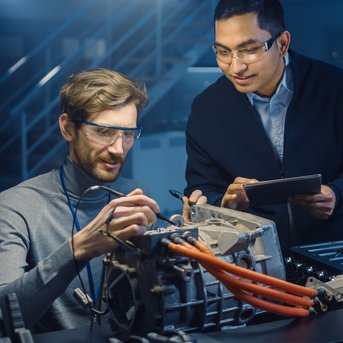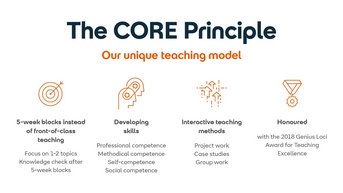Energy storage, electric cars and ethics. Gain a thorough understanding of battery production! Our dual engineering Master's combines production engineering, battery technology as well as sustainability management and strengthens your soft skills.
All Facts at a Glance
Learn about battery development & energy storage
The storage of sustainably generated energy is becoming more and more important. Batteries are not only relevant for the use in electric vehicles but also for stationary applications. In order to push the energy revolution forward, a new generation of experts is needed who understand the technological and business aspects of battery production and are able to put these topics into the overall industrial and social context.
Our M.Eng. Sustainable Battery Production Engineering provides you with both technical expertise in battery technology and production engineering as well as knowledge of management basics.
In the Master's programme, you learn more about the technological principles of battery systems and battery production techniques and current technologies such as automation, robotics and mechatronics. You gain an understanding of measurement technology, quality assurance, data analysis and recycling technologies and study and work hands-on thanks to the integrated lab and team work activities.
Modules on product lifecycle management, risk and project management and innovative business models are part of the curriculum as are digital signal processing, artificial intelligence, cloud technologies and virtual reality.
In addition, you get to view economic and technical systems not just from an individual but a comprehensive perspective and learn to always make decisions taking sustainability into consideration.
The topics circular economy and sustainable development are therefore guiding principles that help you take ecological, social and ethical challenges that are associated with battery production into account. This way you do not only extend your expertise but also get to further develop your personality.
Thanks to the skill- and project-focused approach, you are able to strengthen your analytical, communicative, social and intercultural skills in projects and during your work in your partner company. The dual concept also helps you not only to gain better insights into everyday working life and its challenges, you also build up a network, become an integral part of the partner company and thus increase your career prospects.
In addition, you will have the opportunity to obtain the following extracurricular certificates:
- Siemens Mechatronic Systems Certificate Program (SMSCP) at level 1-2
- Battery Technician (European Battery Alliance & EIT-InnovEnergy)

Become a process engineer, innovation manager, ...
The increasing demand for electric vehicles and energy storage systems for private and commercial use also creates an increased need for new battery technologies and a growing global battery production.
As a graduate of the Master of Engineering in Sustainable Battery Production Engineering, you have learned to view battery production from different angles. Apart from using only your technical and business knowledge, you also consider social and environmental factors when performing analyses and making business decisions
The work assignments in your partner company, study projects, laboratory work and innovative academic formats will help you train your technical and soft skills and increase your network and employability.
After completing your Master's degree in battery technology, you will be a sought-after generalist that can start a career in various areas of battery production, in today's and tomorrow's automotive industry and its suppliers but also in the public sector or in consulting.
Career opportunities lie in the following industries and areas:
- Automotive industry
- Automotive suppliers
- Manufacturers of other battery types (e.g. stationary applications)
- Recycling solutions for batteries
- Consulting and training in battery production
- Digital industrial and service applications
Graduates of the Engineering Master's are able to apply for positions such as:
- Innovation manager
- Product manager
- Project manager
- Process Engineer
- Consultant
- Expert and Engineering positions
- and many more
The internationally-recognised Master of Engineering degree also qualifies students to pursue a doctorate.


Your modules
In the first semesters of your Master's programme in Sustainable Battery Production Engineering | dual, you will acquire in-depth knowledge of the fundamental principles of sustainable battery technology and production processes. You will deepen your expertise in materials science, battery design and energy-efficient production. You will also develop a deep understanding of battery technology's ecological and economic aspects, particularly about sustainability and the circular economy.
During your studies, the focus will be on optimising production processes, automation, quality assurance, and resource management. As part of your dual study programme, regular work assignments allow you to apply your theoretical knowledge in a real company environment and gain valuable practical experience before writing your Master's thesis.
Your curriculum
1st semester
-
Fundamentals of Batteries
5 -
Tools & Methods of Data Analysis
5 -
Advanced Data Processing for Artificial Intelligence
5 -
Digital Signal Processing, Sensors and Cloud Technologies
5 -
Company Work I
10
2nd semester
-
New Industrial Technologies
5 -
Production Engineering I
5 -
Measurement Techniques I
5 -
Company Work II
15
3rd semester
-
Sustainability and Product Lifecycle Management
5 -
Production Engineering II
5 -
Measurement Techniques II
5 -
Company Work III
15
4th semester
-
Master's Thesis and Defence
30

Apply your skills in real life
Today, soft and social skills are crucial in addition to hard skills and expertise. That's why SRH University's innovative, successful, and award-winning CORE principle promotes independent and active learning so that you can apply your knowledge directly to projects and your future career—for a clear competitive advantage.



